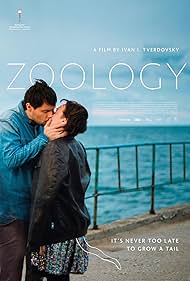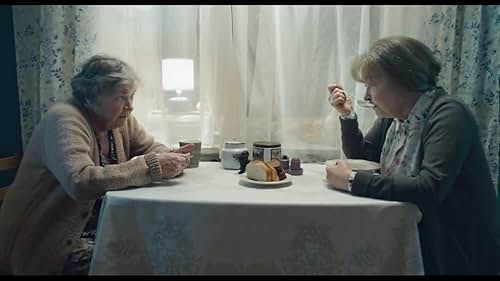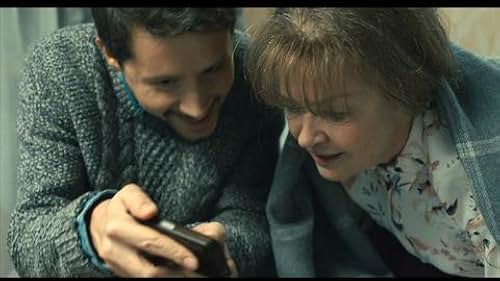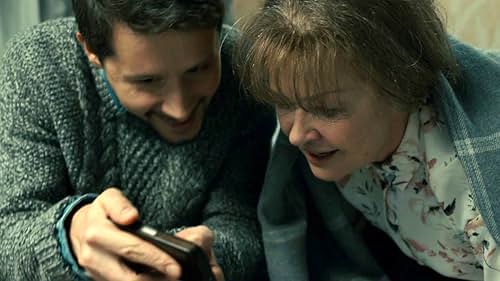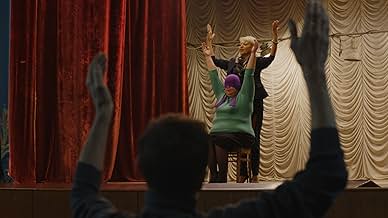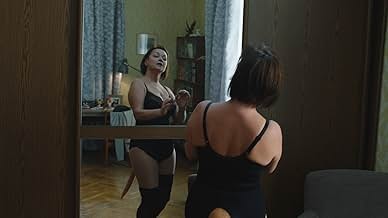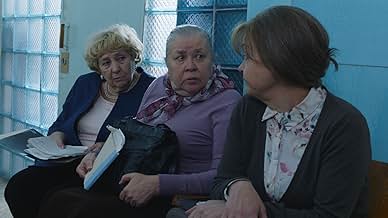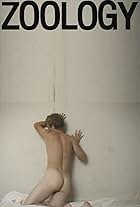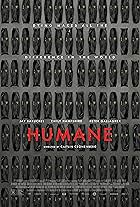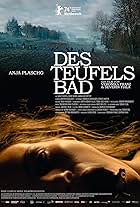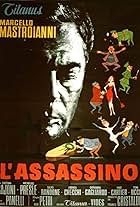IMDb रेटिंग
6.4/10
1.2 हज़ार
आपकी रेटिंग
अपनी भाषा में प्लॉट जोड़ेंMiddle-aged zoo worker Natasha still lives with her mother in a small coastal town. She is stuck and it seems that life has no surprises for her until one day - she grows a tail and turns he... सभी पढ़ेंMiddle-aged zoo worker Natasha still lives with her mother in a small coastal town. She is stuck and it seems that life has no surprises for her until one day - she grows a tail and turns her life around.Middle-aged zoo worker Natasha still lives with her mother in a small coastal town. She is stuck and it seems that life has no surprises for her until one day - she grows a tail and turns her life around.
- पुरस्कार
- 11 जीत और 21 नामांकन
Zhanetta Demikhova
- Zoo Director
- (as Demikhova Zhanna)
कहानी
क्या आपको पता है
- कनेक्शनReferenced in Vecherniy Urgant: Andrey Knyshev/Bi-2 (2016)
फीचर्ड रिव्यू
A middle-aged zoo worker Natasha (Natalya Pavlenkova) still lives with her mother in a small coastal town. She is stuck and it seems that life has no surprises for her until one day she grows a tail and turns her life around.
The first thing this film does right relates to the tail that Natasha grows and how it remains unexplained by the film in general or by the medical professionals she visits in particular. In fact, the doctors do not even seem all that surprised by the appendage when it surely is the only time they had seen such a thing. One doctor briefly says something like, "Oh, I see" before continuing on with his day without missing a beat.
The setting is also wisely chosen as we have a community that accepts witchcraft over rational explanation. In most places, a tail might be seen as a medical oddity, or something to be gawked at, but not the sign of devil worship. Rural Russia, at least as it is presented here, is quite the interesting place. And indeed the country is rife with superstitions, far more than in the United States. For example, they say unmarried people should not sit at the corner of the table as this will lead them to become spinsters. Nonsense? Not to many Russians. So seeing the devil in an extra appendage may not be out of the question.
Critic Jessica Kiang says the director "overloads his simple, provocative premise with too many clashing ideas, which blunts its potential impact and obscures its message". And multiple reviewers have commented on how Natasha sees too much of her self-worth through the eyes of her beau. This, they say, ruins any uplifting or individualistic message the film might have. But perhaps these reviewers are missing the point? Is it necessary for the film to be uplifting or liberating? It may, in fact, be a stark realism we are given — with the conceit being the tail of course. One might find it perfectly natural to express more self-esteem when loved and then later be disheartened when you find the love was misplaced. Not all movies must have a happy ending or be so neat.
The same can be said for the message being obscured. Perhaps the message is that there is no message. Yes, the tail could be an allegory for something in Russian society but sometimes a tail is just a tail. A film can be simple and be exactly what it presents itself to be. And this is not the work of David Lynch. Anyone who claims to fully understand "Lost Highway" or "Mulholland Drive" is a liar; "Zoology" is neither of these, but a story that is as plain as the nose on one's face (or tail on one's coccyx).
The Arrow Films Blu-ray has a 12-minute interview with actor Dmitriy Groshev (who played the doctor), where he acknowledges the meaning of the film is hard to express. He also talks of the differences between Russian and English audiences, and how average Russians fear the idea of subtext. There is also a 24-minute video discussion with critic and Eastern Europe cinema expert Peter Hames about the latest breed of Russian directors.
The first thing this film does right relates to the tail that Natasha grows and how it remains unexplained by the film in general or by the medical professionals she visits in particular. In fact, the doctors do not even seem all that surprised by the appendage when it surely is the only time they had seen such a thing. One doctor briefly says something like, "Oh, I see" before continuing on with his day without missing a beat.
The setting is also wisely chosen as we have a community that accepts witchcraft over rational explanation. In most places, a tail might be seen as a medical oddity, or something to be gawked at, but not the sign of devil worship. Rural Russia, at least as it is presented here, is quite the interesting place. And indeed the country is rife with superstitions, far more than in the United States. For example, they say unmarried people should not sit at the corner of the table as this will lead them to become spinsters. Nonsense? Not to many Russians. So seeing the devil in an extra appendage may not be out of the question.
Critic Jessica Kiang says the director "overloads his simple, provocative premise with too many clashing ideas, which blunts its potential impact and obscures its message". And multiple reviewers have commented on how Natasha sees too much of her self-worth through the eyes of her beau. This, they say, ruins any uplifting or individualistic message the film might have. But perhaps these reviewers are missing the point? Is it necessary for the film to be uplifting or liberating? It may, in fact, be a stark realism we are given — with the conceit being the tail of course. One might find it perfectly natural to express more self-esteem when loved and then later be disheartened when you find the love was misplaced. Not all movies must have a happy ending or be so neat.
The same can be said for the message being obscured. Perhaps the message is that there is no message. Yes, the tail could be an allegory for something in Russian society but sometimes a tail is just a tail. A film can be simple and be exactly what it presents itself to be. And this is not the work of David Lynch. Anyone who claims to fully understand "Lost Highway" or "Mulholland Drive" is a liar; "Zoology" is neither of these, but a story that is as plain as the nose on one's face (or tail on one's coccyx).
The Arrow Films Blu-ray has a 12-minute interview with actor Dmitriy Groshev (who played the doctor), where he acknowledges the meaning of the film is hard to express. He also talks of the differences between Russian and English audiences, and how average Russians fear the idea of subtext. There is also a 24-minute video discussion with critic and Eastern Europe cinema expert Peter Hames about the latest breed of Russian directors.
टॉप पसंद
रेटिंग देने के लिए साइन-इन करें और वैयक्तिकृत सुझावों के लिए वॉचलिस्ट करें
- How long is Zoology?Alexa द्वारा संचालित
विवरण
बॉक्स ऑफ़िस
- बजट
- $30,00,000(अनुमानित)
- दुनिया भर में सकल
- $19,572
- चलने की अवधि1 घंटा 31 मिनट
- रंग
- पक्ष अनुपात
- 1.85 : 1
इस पेज में योगदान दें
किसी बदलाव का सुझाव दें या अनुपलब्ध कॉन्टेंट जोड़ें

